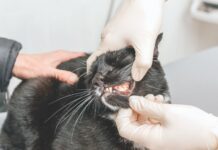Question: A friend of mine gave me a kitten last June. He was lovely – part Siamese and part Himalayan with pretty blue eyes, gray and white fur, and a very bushy tail. One day we noticed him breathing very hard and took him to our veterinarian. After examining his x-rays, the veterinarian said his chest was full of fluid. She withdrew some of the fluid with a needle to help him breathe better, and sent some of it to the laboratory for testing. Asha died a few days later. Our veterinarian performed an autopsy, but she did not find any tumors, and the heart and lungs looked fine. We havent heard anything from the lab yet.
Do you have any idea what could have been the cause of his illness and death? My husband and I are in our 70s, and we were both very close to Asha. It has hurt us so because we lost him. He was such a joy for the short time he was with us.
Answer: We feline people love all the cats with which we have shared our homes, and from time-to-time were blessed with an extra special kitty. Exactly what makes that cat so dear is impossible to put into words. Such a friendship is precious, and the loss can be devastating and more than one can bear alone.
Should you wish to share your feelings with others who care deeply for cats, contact a pet loss support hot line such as the one at Cornell, 607-253-3932, which is staffed by veterinary students Tuesday, Wednesday and Thursday 6:00-9:00 p.m. eastern time, or ask your veterinarian about support groups in your area.
Too much of a good thing
The lungs dont attach directly to the inner surface of the chest wall, and a thin layer of fluid (called pleural fluid) lies between the surfaces to act as a lubricant. There is usually not much fluid present – about half a teaspoon or so in cats – but it is continuously produced and constantly reabsorbed so a constant volume is maintained.
This flux of fluid requires a number of physiologic forces that can broadly be classified into two types: those that act to increase fluid formation and those that act to decrease fluid re-absorption. An excess of forces that increase fluid production (like congestive heart failure, low blood protein, or infection), an excess of forces that block re-absorption (like cancer or trauma), or a combination of the two can cause too much fluid to accumulate. If the volume is too great, the lungs become compressed and breathing is severely compromised.
A sign of major problems
Your veterinarians fear for the worst was justified because most of the underlying conditions are serious and may be difficult or impossible to resolve. A few examples (in no particular order):
Cancer (a leading cause)
Congestive heart failure (a leading cause)
Feline infectious peritonitis (a leading cause)
Infection within the chest
Heartworm disease
Diaphragmatic hernia (a tear in the thin muscular wall between the thorax and abdomen, allowing abdominal organs to enter the chest)
Pulmonary thromboembolism
Granted, the number of potential causes is daunting, but a diagnosis can usually be reached without too much difficulty. The cats age may narrow the possibilities: Certain kinds of cancer and feline infectious peritonitis are much more common in young cats, whereas other kinds of cancer and congestive heart failure are more common in elderly cats. Cats allowed outside are more subject to severe trauma and to infections within the chest. But thorough physical examination is indispensable, and subtle changes on x-rays might provide additional clues. If necessary, blood tests, sophisticated imaging studies like ultrasound, and biopsy of suspicious masses can be performed.
Still, the single-most important piece of the puzzle is fluid analysis. Similar types of fluid can be found with a number of different diseases, but in combination with the results of physical examination and other studies, the diagnosis is usually straightforward. There are always exceptions, though, and some cases can be elusive – even after post-mortem examination.
The outcome rests completely on whether the underlying disease can be managed. If it cant, the prognosis for cats with pleural effusion is always poor.



